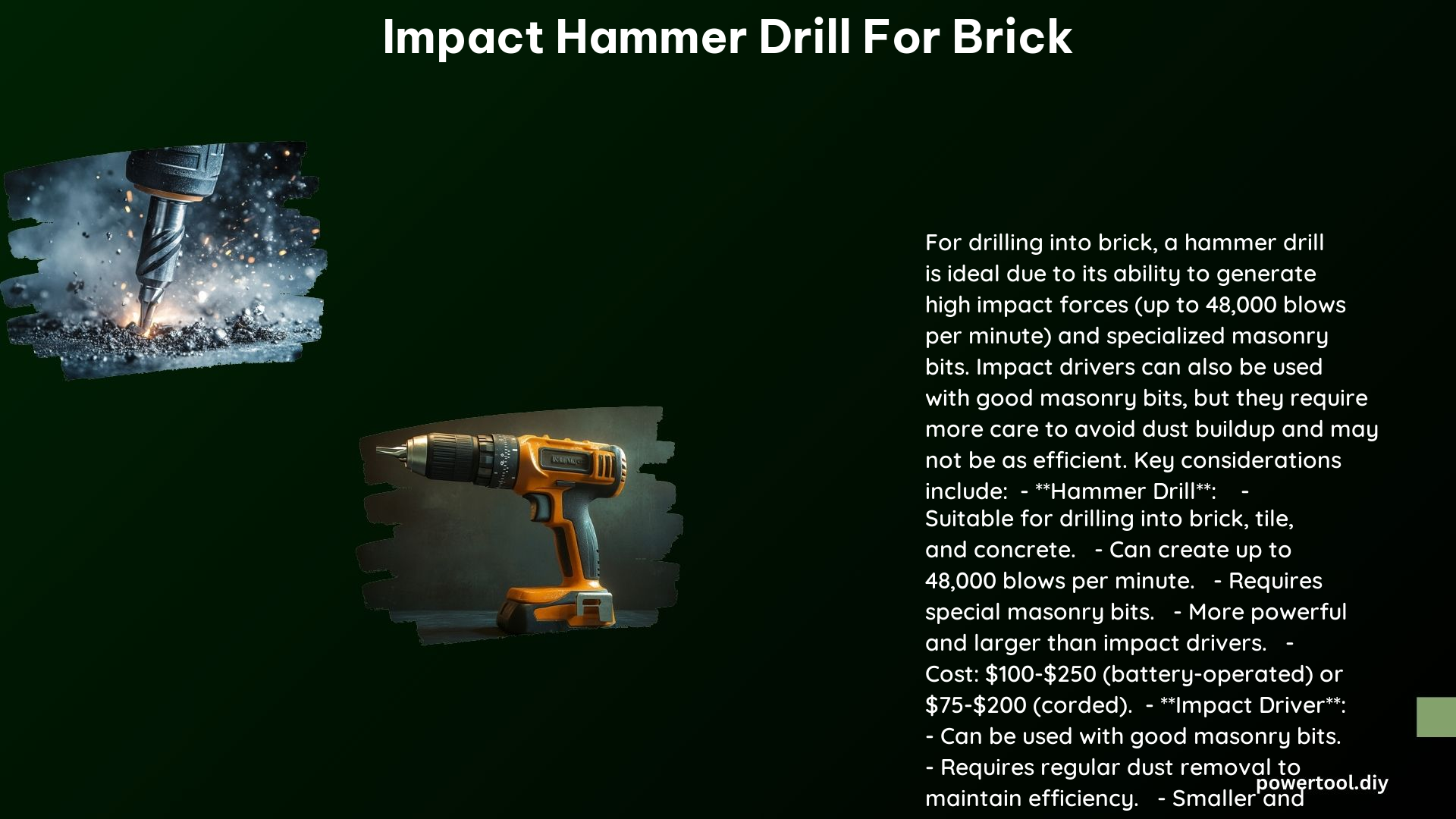When it comes to drilling into brick walls, having the right tool is crucial for efficient and safe drilling. Impact hammer drills are specifically designed to tackle the tough demands of masonry work, offering a powerful combination of rotational force and percussive action to bore through brick, concrete, and other dense materials with ease. In this comprehensive guide, we’ll dive deep into the technical specifications, features, and best practices for using an impact hammer drill for brick projects.
Difference Between Impact Driver and Hammer Drill for Brick Drilling
While both impact drivers and hammer drills are powerful tools, they serve distinct purposes. An impact driver is primarily designed for driving fasteners, such as screws and lag bolts, into wood or metal. It uses a rapid, high-torque impact mechanism to quickly drive in these fasteners, but it lacks the specialized features needed for drilling into masonry.
On the other hand, a hammer drill is specifically engineered for drilling into tough materials like brick, concrete, and tile. It features a “hammer” function that activates a mechanism inside the drill, delivering a series of powerful impacts to the back of the chuck. This impact force is then transmitted down the length of the drill bit, allowing the user to efficiently bore through even the most stubborn masonry surfaces.
Can an Impact Driver Be Used for Drilling into Brick?

While it is possible to use an impact driver with a masonry drill bit to drill into brick, it is not the ideal tool for the job. Impact drivers are simply not designed to handle the demands of masonry drilling. They may struggle to generate enough force to effectively drill through the brick, leading to slower progress and potentially damaging the tool or the brick itself.
Choosing the Right Drill Bit for Brick Drilling
Selecting the appropriate drill bit is crucial for efficient and safe drilling into brick walls. Here are some key considerations:
Masonry Bits
Use drill bits specifically designed for masonry applications, such as carbide-tipped masonry bits. These bits feature a reinforced tip and are engineered to withstand the high stresses of drilling into brick, concrete, and tile.
Bit Size and Type
The size and type of masonry bit you choose will depend on the specific project requirements. For most brick drilling tasks, a 1/4-inch hex shank masonry bit is a versatile and widely-used option.
Bit Quality
Invest in high-quality masonry bits from reputable brands like Milwaukee, Bosch, or DeWalt. These premium bits are designed to last longer, perform better, and withstand the rigors of heavy-duty masonry drilling.
Technical Specifications of Impact Hammer Drills for Brick
When selecting an impact hammer drill for brick drilling, consider the following key technical specifications:
Power
Look for a drill with a minimum of 18V of power to ensure it can handle the demands of drilling into brick. Higher-powered models, such as 24V or 36V drills, will provide even more muscle for the toughest masonry projects.
Speed
A variable speed setting allows you to adjust the drill speed to match the material being drilled. This helps optimize performance and prevent damage to the bit or the workpiece.
Torque
A higher torque rating ensures the drill can generate the necessary force to drill through brick effectively. Aim for a model with at least 50 Nm (37 ft-lbs) of torque.
Hammer Function
The hammer function is the key feature that sets an impact hammer drill apart from a standard drill. Look for a model that can deliver a high number of blows per minute (BPM), typically in the range of 0-32,000 BPM, to maximize drilling efficiency.
Chuck Type
A 1/4-inch hex shank chuck is a common and versatile option that is compatible with a wide range of masonry drill bits.
Recommended Impact Hammer Drill and Bit Sets for Brick
Here are some top-rated impact hammer drill and masonry bit sets for drilling into brick walls:
- Milwaukee Shockwave Impact Duty 10Pc Carbide Hammer Drill Bit Set: This set includes 10 high-quality, carbide-tipped masonry bits designed for drilling into brick, concrete, and tile.
- Bosch 7 pc. Hex Shank Hammer Drill Masonry Bit Set LBHXS7U: This set features 7 premium-quality masonry bits with a 1/4-inch hex shank, perfect for use with impact hammer drills.
- DEWALT 14-Piece Hammer Drill Bit Set: This comprehensive set includes 14 masonry bits ranging from 1/4-inch to 1/2-inch in diameter, providing a versatile solution for a variety of brick drilling projects.
- Makita 10-Piece Carbide-Tipped Masonry Drill Bit Set: Makita’s high-performance masonry bits are designed to deliver long-lasting durability and efficient drilling in brick, concrete, and tile.
Conclusion
When it comes to drilling into brick walls, an impact hammer drill is the tool of choice. By understanding the key differences between impact drivers and hammer drills, selecting the right masonry drill bits, and considering the technical specifications of impact hammer drills, you can ensure efficient and safe drilling for all your brick-related projects. With the right tools and techniques, you’ll be able to tackle even the toughest masonry surfaces with confidence.
Reference:
– Impact Driver vs Hammer Drill: What’s the Difference?
– How to Choose the Right Drill Bit for Masonry
– Best Hammer Drill for Concrete and Masonry
